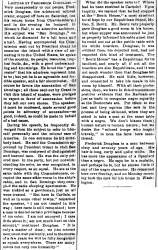Record Data
Transcription
LECTURE BY FREDERICK DOUGLASS. – Very unexpectedly to our people, Frederick Douglass, the celebrated colored orator, stopped off here on Saturday, (on his return home from Chambersburg,) and in the evening he lectured in Rheem’s Hall, to an attentive audience. His subject was “San Domingo,” on which he discanted for a full hour and a half. Having accompanied the Commission sent out by President Grant to examine the island with a view of annexing it to the United States, he spoke of the country, its people, resources, tropical fruits, &c., with a good understanding and knowledge. He is not the “great orator” that his admires represent him to be; but yet he is an agreeable and forcible speaker, and a fair elocutionist. Of course he favors the annexation of San Domingo; all those sent out by Grant to visit this island of snakes, were pledged to report in favor of annexation before they left our own shores. The speaker, it must be confessed, made several good points in advocacy of annexation – as good, indeed, as could be made in behalf of a bad cause.
During his speech, he frequently diverged from his subject to refer to himself personally and the colored race of America. In one sentence he hit someone hard. He said the Commission appointed by President Grant to visit San Domingo, was composed of distinguished and learned men. He was the only colored man in the party, but yet notwithstanding his color, he was recognized, in every respect, as an equal. He ate at the same table with the Commissioners, occupied the same state room in the ship’s cabin, and in San Domingo they occupied the same sleeping apartments. He was treated as a gentleman, just as all were treated. “But here in Carlisle, as well as in some other towns,” remarked the speaker, “I am not treated in this way; here caste is still recognized; here a man is denied certain privileges because of his color. I am not annoyed; I care little about it; am not much hurt on this account,” continued Douglass. “It is only a matter of time; we (the colored men) must wait patiently, and in the course of a few years we will be fully recognized as equals everywhere. There are many colors but only one humanity.”
What did the speaker refer to? Where had he been snubbed in Carlisle? Upon inquiry, we learned that he had stopped at the “Bentz House,” a most excellent hotel kept by our Republican friend, Mr. Geo. Z. Bentz. Mr. Bentz very properly gave Douglass a good room in his house, but when supper was announced he just as properly informed his sable guest that he could not eat at the public table with his white boarders. Douglass, it was evident from his dejected look, had not expected this kind of treatment. The “Bentz House” has a Republican for its landlord, and nearly all if not all the boarders are also Republicans, and it was not much wonder then that Douglass felt disappointed. He said little, however, and consented to take his meals in his room by himself. With all their professions, then, we have in this circumstance positive evidence that the Radicals are just as loath to recognize negro-equality as the Democrats are. Put them to the test and they squirm like eels in the process of being skinned, when they are asked to take a seat at the same table with a negro. We don’t blame them; human nature is human nature; but we desire the “colored troops who fought bravely,” to note the facts here mentioned.
Frederick Douglass is a man between sixty and seventy years of age. His hair is long, curly and quite white. He has more the appearance of a Spaniard than a negro. He says he is a mulatto, and perhaps he is, but he shows little if any of the negro character. He remained here over Sunday, and on Monday morning took the cars for his home in Washington.




